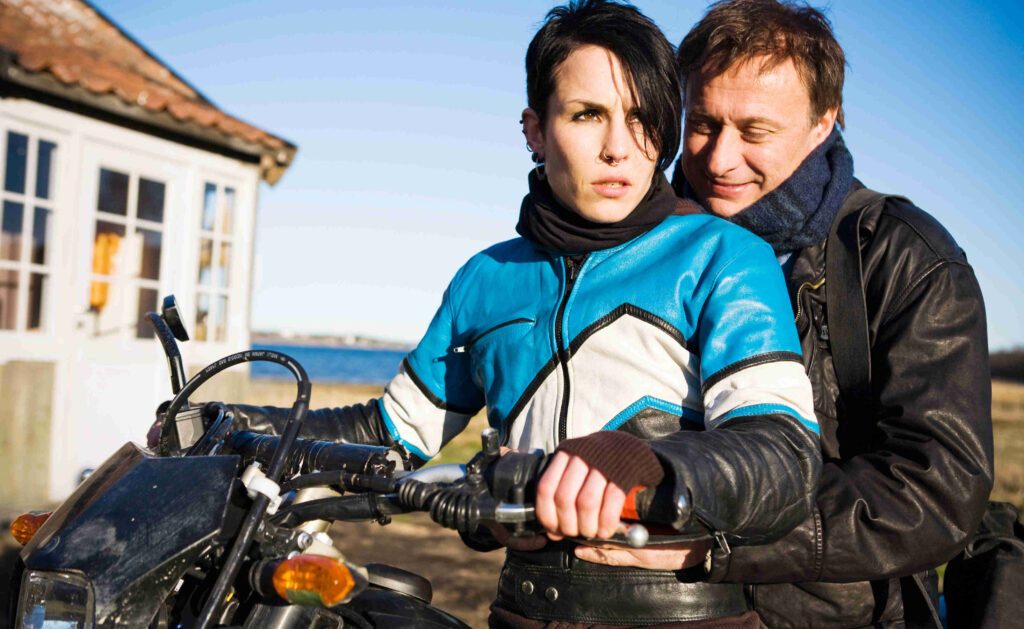
It took some time, but I finally got around to watching the original Scandinavian screen version of The Girl with the Dragon Tattoo (as the Millennium TV series). As nasty, moody and twisted as it is, it’s a really good movie.
By Emad Aysha
Admittedly, I haven’t read the novel, but the 2011 David Fincher version is so different. And you can imagine which is better. Dragons don’t transfer well to the American screen. The question is ‘why’.
For those who haven’t watched either movie, you have Mikael Blomkvist, a crusading journalist who’s in trouble for losing a libel suit against a shady millionaire. He gets hired by an old, wealthy man who is captivated by the mystery of his niece, who has been missing for the past 40 years. He suspects his own bloated, self-interested family.
In the process, a female computer hacker, Lisbeth Salander, who was hired to keep tabs on Mikael, gets involved in the investigation. The dynamic between the two, played perfectly by Michael Nyqvist and Noomi Rapace, is just delicious.
It’s so restrained. So much isn’t said, let alone explained, and while they keep their emotional and intellectual distance much of the time, you know they love each other. Sadly, commitment isn’t in their lingo.
Their manners and character traits make a great pair to look at. He’s the polite, soft-spoken, and almost homely type. He does all the cooking and cleaning while she’s a scruffy mess and a boyish punk rocker. If you get what I mean, he’s the father figure she should have had.
Hence the sex scene, where she goes after him despite her apparent lesbianism. Now contrast all of this with Daniel Craig and Rooney Mara. The first is a snivelling little bitch, and the second is a hyperactive superwoman!
In the Scandinavian movie, the two have sex first, and then he gets shot at and runs home to her. In the American film, he’s crying like a baby; she stitches his wounds while berating him and then has sex with him when he’s at his most vulnerable.
There are a lot of scenes like this, and it goes to show where the assault on masculinity in America is coming from – a bloody, polarized, winner-takes-all way of looking at things. But, critically, the feminism is all skin deep.
Fincher, as brilliant as he is, didn’t even understand the source material when it comes to the bad guy burning to death after the car accident. She burned her abusive father as a child, so this is a repeat for her.
That doesn’t happen with the too-bad guy in the Fincher flick, the sinister-looking Stellan Skarsgård. There are also Lisabeth's tattoos and get-ups. She’s making herself look like a boy to forget how she was attractive as a cute little girl to her monster dad.
When she gets abused again by her sex-fiend ‘guardian’, something like a parole officer, she gets a new tattoo. It’s commemorating her torment, a barbed wire pattern – or a crown of thorns. By contrast, the scene where Mara gets back at her guardian is also hyperbolic and sanitised, whereas Noomi Rapace’s scene is ‘epic.’
It involves chains and a dildo, and a tattoo denouncing the man as a sadist and rapist. There are also political undertones that the American version either can’t catch onto or doesn’t care about. The serial killer, the person you least suspect, picks on whores and ‘immigrants’ and he was trained into this by his racist psychopath father, a self-professed Nazi who picked on religious minorities.
The original screen version is picking apart antagonisms in Scandinavian society, with gay bashers – Noomi gets mistaken for a man by some drunks – and war profiteering and, yup, racism against foreigners. Something that existed in the past, even before there was an immigration problem.
You get an unflattering portrayal of European society in general, which clearly is thriving off of strife in the Third World and then punishing the very Third World immigrants who left because their lands have been stolen. But ultimately, all this cruelty leads to a kind of cultural cannibalism, where you prey on your own in the end.

JOURNALIST AT ITS BEST: The late, great Michael Nyqvist taking a backseat in 'The Girl with the Dragon Tattoo' (2009). It pays to play second fiddle in this movie!
Hence the missing girl, who was raped by both her father and then her brother. This may be a coincidence, but in the original screen version, she escaped to Australia, a former ‘colony’. In the American version, she goes to England, which is silly because it’s a stone’s throw away from Sweden.
Sweden isn’t portrayed nicely either since the investigation happens on an island, with only one bridge connecting it to the outside world, with everybody knowing everybody – an isolated village. It's a perfect recipe for xenophobic racism and, well, being too close to your own kind.
Lisebth is attracted to the case and the journalist hero because she feels her own plight in the mystery of the missing girl, and her story with the predatory guardian (a euphemism for father) thematically replicates that case.
I presume she’s also meant to be in the country, abused and neglected and forced to fend for herself. No cops come to her aid when she gets attacked by the yobs. There’s graffiti everywhere too. That sums up what’s going on in Europe right now, with the poor taking their anger out on the imported poor instead of going after the natural source of their misery – the footloose capitalists.
Oh, and the assault on masculinity isn’t helping either – imported from the US. It’s feeding the right-wing paranoia and misogyny even more. (I wrote this article before the big election you-know-where).
The only counter the movie can think of is freedom of information, hence the cameras Lisbeth uses. I’ve got a better remedy to this self-reinforcing complex of ills.
Get people, boys and girls, working again by heading off to Mars!






